|
|
|
Sort Order |
|
|
|
Items / Page
|
|
|
|
|
|
|
| Srl | Item |
| 1 |
ID:
124427
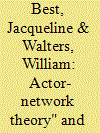

|
|
|
|
|
| Publication |
2013.
|
| Summary/Abstract |
Like any multiplicity, "actor-network theory" is many things: an influential current within the sociology of science and technology; a relational and anti-essentialist form of materialism; an insistence that notions of agency not be confined to human subjects but embrace objects, devices, and other non-human entities; and much else besides.
|
|
|
|
|
|
|
|
|
|
|
|
|
|
|
|
| 2 |
ID:
177724
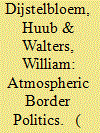

|
|
|
|
|
| Summary/Abstract |
This paper seeks to expand recent interest in the material practices, policy techniques and technopolitics of borders, migration and solidarity initiatives in Europe by connecting this debate to Sloterdijk’s spherological philosophy. With his thematization of enclosures, atmospheres, foams and life support Sloterdijk helps us to give a more morphological account of borders. We illustrate the benefits of this move by reflecting on the recent questions of hostile environment and the criminalization of migrant solidarity practices and movements. The paper also highlights certain limitations in Sloterdijk’s thoughts, which appear when it is brought into migration research. Arguing that Sloterdijk remains somewhat sedantarist in his approach to atmosphere we introduce a concept of the envelope as a way to foster a more dynamic, agonistic and mobilityfocused conception of enclosure.
|
|
|
|
|
|
|
|
|
|
|
|
|
|
|
|
| 3 |
ID:
141215
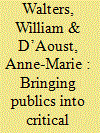

|
|
|
|
|
| Summary/Abstract |
Publics are an undertheorised and somewhat marginal presence in critical security studies. This article argues that a better understanding of publics can advance our understanding of the governance as well as the contestation of security regimes and practices. We develop this argument in three parts. First, we discuss the marginality of publics in critical security studies while highlighting those limited instances where publics have been engaged. Second, we direct attention to emerging research on publics in cognate disciplines, focusing in particular on the literature about material publics. We distil from this work some useful lessons for security studies. In a final section we suggest two research moves for promoting a stronger focus on publics within critical security studies. We conclude that a focus on material publics can furnish security studies with a better understanding of the phenomenon of politics.
|
|
|
|
|
|
|
|
|
|
|
|
|
|
|
|
| 4 |
ID:
145985
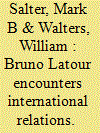

|
|
|
|
|
| Summary/Abstract |
Philosopher and sociologist Bruno Latour’s work on actor-network theory (ANT), science and technology studies (STS), and the politics of nature, has made a substantial impact upon the social sciences, and more recently, International Relations (IR). This interview records Latour’s first direct ‘encounter’ with IR, and explores concepts and topics as varied as sovereignty, the State of Nature, globality and spheres, the thought of Carl Schmitt, war and universalism, Gaia and climate politics, and the creation of publics, secrecy, and politics as a mode of existence. It provides new insight into Latour’s thinking and philosophy, while opening new avenues of research for IR scholars to pursue in the future.
|
|
|
|
|
|
|
|
|
|
|
|
|
|
|
|
| 5 |
ID:
131248


|
|
|
|
|
| Publication |
2014.
|
| Summary/Abstract |
Recent scholarship in critical security studies argues that matter matters because it is not an inert backdrop to social life but lively, affectively laden, active in the constitution of subjects, and capable of enabling and constraining security practices and processes. This article seeks to further the debate about materiality and security. Its main claim is that materials-oriented approaches to security typically focus on the place of materials and objects within technologies and assemblages of governance. Less often do they ask how materials and objects become entangled in political controversies, and how objects mediate issues of public concern. To bring publics and contentious politics more fully into the debate about the matter of security, the article engages with Latour's work on politics, publics and things - or dingpolitik. It then connects the theme of dingpolitik to a particular controversy: Human Rights Watch's investigation of Gaza civilians allegedly killed by Israeli drone-launched missiles in 2008-2009. Drawing three lessons from this case, the article explores how further conversation between dingpolitik and security studies can be mutually beneficial for both literatures.
|
|
|
|
|
|
|
|
|
|
|
|
|
|
|
|
| 6 |
ID:
173882
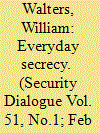

|
|
|
|
|
| Summary/Abstract |
Despite the welcome turn within security studies towards a more material- and practice-oriented understanding of state secrecy, the ways in which security actors experience, practise and negotiate secrecy in their everyday work lives has been rather overlooked. To counter this neglect the article calls for attention to everyday secrecy. Focusing on a former top-secret weapons research facility in the UK called Orford Ness, it uses oral history to give an account of ex-employees’ memories, experiences and practices concerning secrecy. Such a focus reveals that subjects make sense of procedures and rules of secrecy in ways that are sometimes surprising and unexpected. Ultimately this perspective emphasizes that secrecy is not just what governments and organizations prescribe and proscribe; it is also shaped by subjects who negotiate these rules. Everyday secrecy matters: as a perspective it shows that secrecy is not simply imposed by states and organizations from ‘above’; it is also made from ‘below’, albeit very asymmetrically.
|
|
|
|
|
|
|
|
|
|
|
|
|
|
|
|
| 7 |
ID:
146092
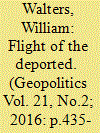

|
|
|
|
|
| Summary/Abstract |
This article calls for studies of migration, borders and deportation to bring the practices and dynamic spaces of transportation more fully into the research frame. While modern deportation is unthinkable without vehicles, transport is a black box for the interdisciplinary literature on the state-enforced movement of population. This article focuses on deportation by air and engages largely with policies and practices relating to the UK deportation experience. It has two aims. First, to offer a critical analysis of the techniques and tactics that are used to turn commercial and charter flights into machineries of deportation. Second, to show that aviation is not a mere instrument that puts deportation policy into practice, but, like other material places in the deportation and detention world, an irreducible zone of knowledges, tactics, and politics. A proper understanding of the deportation complex is radically incomplete without an account of the mobile places of transportation.
|
|
|
|
|
|
|
|
|
|
|
|
|
|
|
|
| 8 |
ID:
053389
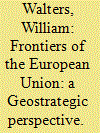

|
|
|
|
|
| Publication |
Autumn 2004.
|
| Summary/Abstract |
While state borders remain the pre-eminent frontiers within geopolitics, regional blocs are also acquiring frontier characteristics. How might we understand the function and identity of such frontiers? Taking the European Union as its focus, this article offers answers to these questions by developing the idea of geostrategy. Four geostrategies are identified: networked (non)borders, march, colonial frontiers and limes. Each corresponds with a particular way of territorialising the space of the border, as well as a certain idea of ‘inside’ and ‘outside’, and of the risks and problems that the border is to govern. A geostrategic perspective uses contemporary social forms (such as networks) but also historical forms of borders (march, limes) in order to enhance the intelligibility of the frontiers of the EU. As such, this approach seeks to capture the multiplicity and plurality of borders.
|
|
|
|
|
|
|
|
|
|
|
|
|
|
|
|
| 9 |
ID:
059555
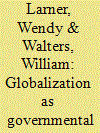

|
|
|
|
|
| Publication |
Nov-Dec 2004.
|
|
|
|
|
|
|
|
|
|
|
|
|
|
|
|
| 10 |
ID:
058914
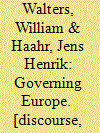

|
|
|
|
|
| Publication |
London, Routledge, 2005.
|
| Description |
vii, 168p.
|
| Series |
Routledge advances in European politics
|
| Standard Number |
0415321980
|
|
|
|
|
|
|
|
|
|
|
|
Copies: C:1/I:0,R:0,Q:0
Circulation
| Accession# | Call# | Current Location | Status | Policy | Location |
| 049180 | 341.2422/WAL 049180 | Main | On Shelf | General | |
|
|
|
|
| 11 |
ID:
152725
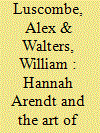

|
|
|
|
|
| Summary/Abstract |
Using Hannah Arendt as our guide, we examine the imperfect and at times curious mechanisms through which state projects enact an aura of secrecy and deception. To date, International Political Sociology (IPS) has paid strikingly little attention to the workings of secrecy and deception in politics. Arendt’s contributions to international political sociologies of state secrecy are threefold. First, Arendt’s reflections on lying and secrecy occur across a wide historico-philosophical field, generating insights that a focus on liberal democracy alone cannot. Second, Arendt draws our attention to important variations in the arts of secrecy and deception, and their ethico-political implications. Third, Arendt highlights the limits of traditional scholarly methods for research on lying and secrecy and offers an important tool that we conceptualize as a twist. We demonstrate these three contributions through a case study of a foggy Anglo-American intelligence project called Cobra Mist.
|
|
|
|
|
|
|
|
|
|
|
|
|
|
|
|
| 12 |
ID:
124431
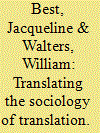

|
|
|
|
|
| Publication |
2013.
|
| Summary/Abstract |
Actor-network theory, material semiotics, the sociology of translation… The precise name of the domain in question is not itself entirely stable, and rightly so. In the ANT scheme of things, society is far less stable, representation and governance considerably more disputed, and order quite a bit more precarious, than most other frameworks would allow. Flux and impermanence are minor and tangled threads running throughout the history of the Western political imaginary: from Heraclitus and Lucretius to Nietzsche and Deleuze. No other research framework has married this minor current with empirical inquiry in a manner that is as thorough, practical, and relentlessly materialist as ANT. Bringing the Heraclitean worldview down to earth is one of its foremost accomplishments.
|
|
|
|
|
|
|
|
|
|
|
|
|
|
|
|
|
|
|
|
|